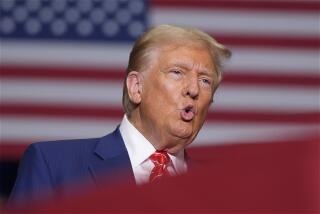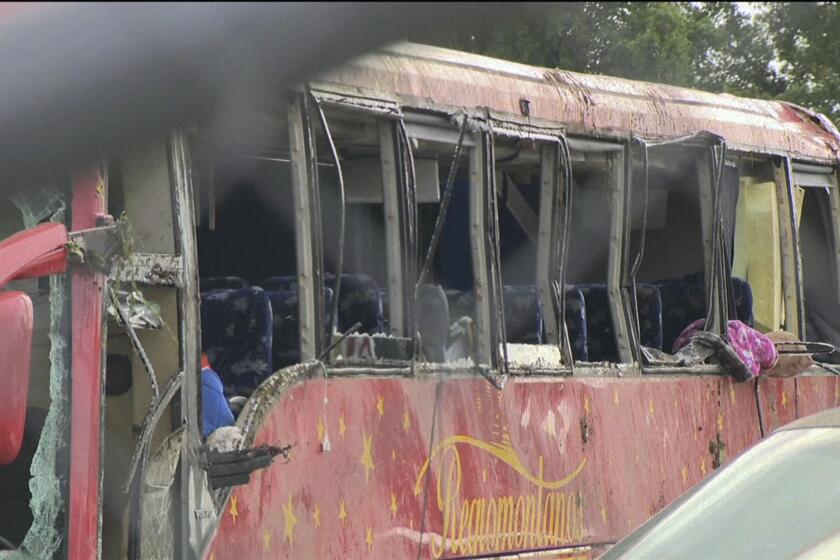Fear of Iraqis Blamed in Firing
A San Marcos executive who helped U.S. Customs Service investigators foil an Iraqi conspiracy to obtain nuclear trigger devices was fired in April, The Times has learned, and he said Wednesday that he believes he lost his job because his company was fearful of Iraqi retaliation.
Jerold Kowalsky, 58, of Scripps Ranch, said “irreconcilable differences” were cited as the cause of his dismissal as president of CSI Technologies. But he said he believes the company’s board was worried that press coverage of his involvement in the investigation had made the company a target for terrorist attacks.
Company officials Wednesday denied that Kowalsky’s participation in the international sting led to his removal but declined any other comment on Kowalsky. The Times could not independently substantiate Kowalsky’s claim.
In the summer of 1988, Kowalsky alerted U.S. Customs and the Central Intelligence Agency that his company, which sells highly specialized voltage capacitors, had received a request from the Iraqis for a capacitor that could be used as a nuclear detonator.
Kowalsky assisted in the subsequent 18-month investigation, playing the role of a U.S. businessman eager to manufacture the devices for the Iraqis. In the end, 40 fake detonators were flown in crates from Los Angeles to London. British authorities later arrested several Iraqis as they attempted to load the cargo on a Baghdad-bound jetliner.
Last fall, Kowalsky was awarded the Yorktown Certificate, one of the highest honors an individual can receive from the Customs Service, for his part in the sting, which officials at the time said “put a dent in Saddam Hussein’s nuclear defense.”
In London on Wednesday, an Iraqi man and a French woman fingered in the sting were convicted in a British court for trying to export the devices to the Persian Gulf nation. Ali Ashour Daghir, 49, was sentenced to five years in prison. Jeanine Speckman, 41, of France will be sentenced today.
However, two months ago, just days before he was to leave for London to testify against defendants in that case, Kowalsky says, CSI Technologies suddenly fired him.
“The fact is, some major stockholders felt that I had too high a profile,” said Kowalsky, who has since begun work as a manager for a company that manufactures parts for military and space radar systems.
“They were worried about retaliation with the Iraqis down the road. They didn’t like the fact that CSI was continually being associated with the Iraqis.”
Within days after his firing, Kowalsky said, CSI company officials sent a letter to Ali Ashour Daghir, an Iraqi businessman convicted Wednesday in the smuggling scheme, informing him that Kowalsky no longer worked at the firm.
Kowalsky called the letter an attempt to keep the Iraqis from taking any revenge against the company because the potential source of their anger was no longer there. The Times could not obtain a copy of the letter.
“I don’t know how they did it, but Mr. Testut sent the Iraqis a letter trying to distance me from the company, saying that I no longer worked for them,” Kowalsky said, referring to Richard Testut, chief executive officer of CSI Technologies. “It was sent after I was fired, and the letter got to Daghir before the trial started. The defense attorney read the letter in court.”
Kowalsky said he felt growing pressure from company officials and major stockholders in March, 1990, after he began granting interviews about the investigation.
During the height of the Gulf War--the day after he had given CNN a live interview at company headquarters--the wife of a major stockholder for the company called the office in hysterics, Kowalsky recalled.
“She was worried that the Iraqis were going to find out who she was,” he said. “She was hysterical. She thought they were going to bomb her house.”
Six weeks before he was fired, Kowalsky said, Testut dispatched a memo saying he was not to talk about the case publicly without the specific approval of the company’s board of directors.
Kowalsky acknowledged that he took time from his job to go to London twice during the sting, but said he did so with the company’s blessing. He said he also contacted potential customers abroad.
Kowalsky said he is not bitter about the firing and wants to put the matter behind him. “These things happen. You roll with the punches.”
Daniel Supnick, a Customs Service investigator who worked with Kowalsky on the sting, said Wednesday that, although he knew Kowalsky no longer worked for CSI, he did not know the particulars of his departure.
“He told me he was no longer with the company, but at no time did I know the particulars,” he said. “As a witness in the ongoing trial, I tried to distance myself from things not germane to the case.”
Reached at his home Wednesday, Testut of CSI refused to comment on the alleged firing or discuss the reasons Kowalsky left the firm.
“His termination was unconnected to his association with the Iraqi matter,” he said.
Other company officials also refused comment.
More to Read
Sign up for Essential California
The most important California stories and recommendations in your inbox every morning.
You may occasionally receive promotional content from the Los Angeles Times.







